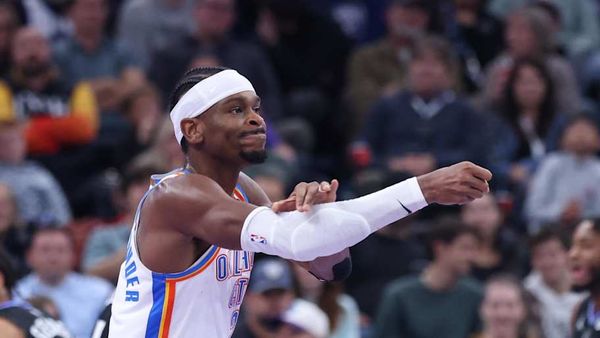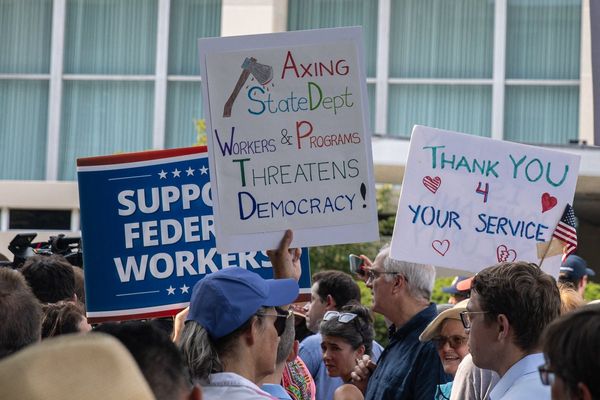
Matthew Bellamy is the kind of gargantuan rock star who always has a groaning inbox of fanciful requests. But one message proved irresistible. “It was about 1984, one of my favourite books in terms of its influence on me over the years,” he says enthusiastically from his home in Los Angeles. “But it was also for” – he pauses for comic effect – “an audiobook. It was those two things together that properly stimulated my imagination.”
If you were creating the ideal dramatic score and soundscape for a new immersive adaptation of 1984 with an A-list cast, the frontman of Muse would likely be topping your wishlist. Bellamy has been inspired by it before: on the thundering rock of the Muse track Citizen Erased, from the band’s 2001 album Origin of Symmetry, and several tracks shuddering with synthesisers and dread-driven guitar solos on 2009’s The Resistance.
But it was “the appeal of it being a different medium, where dialogue and sound effectively interpreted the book” that drew Bellamy to the project as a solo artist. He’d previously composed themes for the 2009 thriller The International, and 2013 Brad Pitt zombie horror film World War Z, but turned down bigger film projects because of recording and touring commitments, knowing how lengthy soundtrack projects can be.
“But audio intrigued me – I thought, maybe I won’t have to edit my music precisely to visuals and get more freedom to try new things,” says Bellamy.
He was right. After getting down “ideas and demos in quite a free form” Bellamy brought in composer Ilan Eshkeri as a collaborator. Eshkeri has composed several acclaimed film and TV scores, as well as scores for games such as The Sims 4 and Ghost of Tsushima, along with innovative work for the European Space Agency and the Louvre in Paris. Bellamy hails him as “an expert orchestrator”.
They first talked after ending up in the same cab after an event, Eshkeri tells me from his north London home. After Bellamy heard his fellow passenger’s name “he started raving about my soundtrack to [Matthew Vaughan’s 2007 fantasy film] Stardust. And I’m thinking: ‘Yes, that was me, but I’m the one sat next to a rock star!’”
Collaborating remotely before spending a month together in London studios, the pair worked to a script mapped out into different short sections and moods.
The orchestra sections had to feel massive, says Bellamy, “because 1984’s about huge stakes – state surveillance, risking everything for sex, life and death”. Eshkeri’s unconventional scores included squiggling figures to get the players performing in peculiar ways. He notes that when it eventually came to the final recording sessions with the London Metropolitan Orchestra at Abbey Road studios, hearing those sections “properly frightened him”.
The pair were allowed to indulge their ideas, and “lots of stuff was inspired by our thoughts about the book”, says Bellamy. Both men read 1984 as teenagers in the early 1990s, not long after the cold war ended. But revisiting it in their mid-40s had a different effect. Eshkeri kept thinking about being “just a bit older than Winston’s age, reading it from a very different point of view in terms of life experience”.
Helped by his work for films and video games, he wanted to bolster the “emotional narrative” in the story – the drama and inner conflicts of 1984’s characters, who are portrayed in the new audio production by the likes of Andrew Garfield, Cynthia Ervio, Andrew Scott and Tom Hardy. But the composers were also mindful of another emotional dimension with the new audio format: “We had to think about the intimacy involved too, of people listening on headphones, being immersed in that world,” says Eshkeri.
Bellamy notes that the emotional power of 1984 encompasses its political message, and he hopes this will resonate with younger listeners. “I mean, my great-grandad lost an eye in the first world war, and my grandfather fought in the second. Now there are generations below me being raised without direct familial warnings about this gigantic ideological battle between authoritarianism and fascism and liberal democracy, so trying to bring prescient stories written in those times to younger generations in any way you can is so important.”
Orwell’s novel has over the years inspired a number of other musical projects, for instance, David Bowie’s Diamond Dogs album, the Radiohead song 2+2=5, and the rejected Eurythmics soundtrack for Michael Radford’s 1984 film version, starring John Hurt. But these weren’t direct influences on the new score. Eshkeri’s synaesthesia, which always influences his work, helped define the aesthetic of their work on 1984. He wanted a different feel to Radford’s palette of muted greys and blues. “I wanted more reds, yellows and greens, to explore this more colourful world of being human among the horror. Even in the most dire and awful situations, people are still able to occasionally smile, to remember who they are.”
Bellamy indulged his love of synthesisers from the early 1980s to accompany the machine-like relentlessness of characters rewriting historical records in 1984’s Ministry of Truth, while notes from an old broken piano accompany sadder moments, like when characters try to locate memories. “I wanted them to sound slightly grimy, reminding us that authoritarian regimes leave everything dirty and broken around the edges.”
He and Eshkeri also worked on four different, eerie minor-key versions of the song Oranges and Lemons, which plays a role in Orwell’s book and which actors Andrew Garfield and Chukwudi Iwuji try to recall in one unsettling, melancholic scene. They also collaborated with Audible’s sound design team on the recurring motif of church bells. And for Muse fans, there’s a great musical Easter egg: the recurring tune of a street busker, a version of their 2009 single Uprising – “which is very much about anti-authoritarianism”, Bellamy adds, impishly.
He says the frightening and unnerving elements of the score were vital. “The book is more relevant today than it was when it was written, almost 80 years ago. We have the rise of authoritarianism in the west, this unbelievable explosion in artificial intelligence and misinformation through social media; we wanted to get that across.”
He also thinks the audiobook has a fascinating future. “There’s this eye relief they offer you in this modern age when we spend so much time looking at screens on our phones or TV. It offers you a very rare experience: properly allowing your imagination to visualise a different world.”
Audible’s new dramatisation of George Orwell’s classic tale stars Andrew Garfield, Cynthia Erivo, Andrew Scott and Tom Hardy, with an original score by Matthew Bellamy and Ilan Eshkeri. Listen now. Subscription required. See audible.co.uk for terms.
Audible and the Audible logo are trademarks of Audible, Inc or its affiliates







